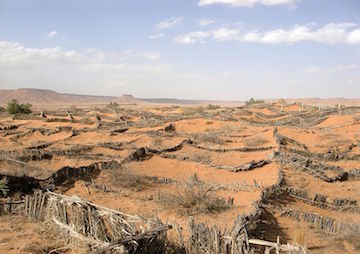Land Degradation Could Create 50 Million Climate Refugees Within a Decade
A U.N.-backed report offers a shocking depiction of the state of our global environment, revealing that about half of the planet's agricultural land is now moderately or severely degraded. Anti-desertification sand fences in Morocco. (Anderson Sady / CC BY-SA 3.0)
Anti-desertification sand fences in Morocco. (Anderson Sady / CC BY-SA 3.0)
Fifty million refugees fleeing hunger and poverty could be created in the next decade unless the world’s land degradation crisis is addressed, according to a new U.N.-backed study.
The report, titled “The Value of Land,” estimates that between $6.3 trillion and $10.6 trillion worth of resources—including agricultural products, soil quality and benefits in tackling climate change—are lost each year due to land degradation. This is equivalent to between 10 and 17 percent of global annual GDP.
From the International Business Times:
“Our lands are no longer able to keep up with the pressures placed on its limited resources. Increasing misuse and demands for its goods are resulting in rapidly intensifying desertification and land degradation globally — an issue of growing importance for all people and at all scales,” the report said.
Globally, 2.6 billion people depend directly on agriculture. According to the report, soil degradation — exacerbated by deforestation and pollution — drought and desertification affect approximately 52 percent of arable land. Over the next 25 years, this might reduce global food production by up to 12 percent, raising global food prices by as much as 30 percent.
However, the authors added, “the economics of land degradation is about a lot more than agriculture.”
Desertification also threatens water availability and quality — a phenomenon that is believed to have played a key role in pushing Syria toward a brutal, protracted civil war that has cost nearly 300,000 lives. According to a previous study, published in the Proceedings of the National Academy of Sciences, an unprecedented drought in Syria between 2007 and 2010 triggered an exodus of nearly 1.5 million farmers to cities in search of food and work — a “contributing factor” that eventually led to the civil war.
Additionally, desertification also jeopardizes global biodiversity. Some estimates suggest that our planet might currently be losing approximately 27,000 species every year, a number that is likely to escalate with increase in the rate of desertification.
“Options to address land degradation include reforestation, afforestation, sustainable agricultural practices, and establishing alternative livelihoods such as eco-tourism,” the authors of the study said, in a statement. “Potential economic tools include payments for ecosystem services, subsidies, taxes, voluntary payments for environmental conservation, and access to micro-finance and credit.”
The report also highlighted the need for definitive action vis-à-vis climate change during the U.N.’s climate change conference in Paris (COP 21) later this year.
“This study by ELD shows the immediate and global impact of land degradation and highlights that actions to tackle it pay off,” Karmenu Vella, European Commissioner for Environment, Fisheries and Maritime Affairs, said in the statement. “Climate refugees will become a new challenge — if we do not act swiftly. We need to be as ambitious as possible in the negotiations for COP 21 in Paris.”
Read the full article here.
–Posted by Roisin Davis
Your support matters…Independent journalism is under threat and overshadowed by heavily funded mainstream media.
You can help level the playing field. Become a member.
Your tax-deductible contribution keeps us digging beneath the headlines to give you thought-provoking, investigative reporting and analysis that unearths what's really happening- without compromise.
Give today to support our courageous, independent journalists.






You need to be a supporter to comment.
There are currently no responses to this article.
Be the first to respond.